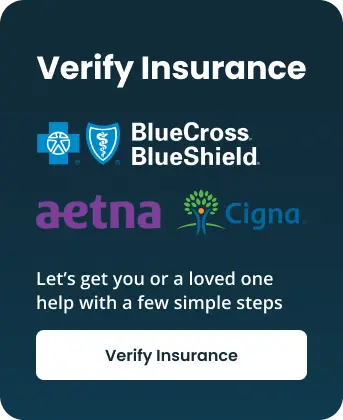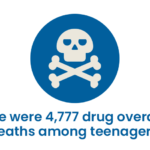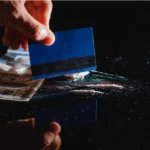Opioids, also known as narcotics, are a class of drugs that include prescription drugs for pain like tramadol, oxycodone, hydrocodone, fentanyl, and others. Heroin, a well-known illegal drug, is also considered an opioid.
After you have undergone a severe surgery or injury, your doctor may prescribe an opioid to help with your pain or health condition. If you experience severe pain from medical issues like cancer, you might also be prescribed an opioid. Certain health care providers prescribe them for chronic pain.
Opioids taken for pain relief are usually safe when used for a brief duration and as directed by a doctor. However, opioid addiction is always a potential risk when taking this drug.
Opioid Misuse and Addiction
Opioid use disorder (OUD) is a chronic medical condition caused by the excessive and repeated use of opioids, such as prescription medications like oxycodone and hydrocodone, or illegal drugs like heroin and fentanyl. OUD involves the dysfunction of the brain’s reward system, motivation, memory, and associated brain circuits.
In 2018, opioid overdoses caused around 47,000 deaths in the United States, meaning one death every 11 minutes. The U.S. Food and Drug Administration (FDA) has approved three medications, including methadone, buprenorphine, and naltrexone.
These medications are the most effective treatments for opioid use disorder (OUD). Using one of these medicines can significantly reduce a person’s risk of illicit drug usage and fatal overdoses.
Medications
Methadone, buprenorphine, and naltrexone are FDA-approved for treating OUD. These medications assist in the treatment of substance abuse by reducing withdrawal symptoms and cravings and preventing relapse. According to a study, these medications are the most effective ways of treating drug dependence and sustaining recovery over the long term.
Methadone
Methadone is a full agonist that completely occupies the mu-opioid receptor. Methadone reduces the painful symptoms of opiate withdrawal and blocks the euphoric effects of other opioid medications.
In contrast to the use of heroin and other opioid agonists used for non-medical purposes, methadone has a longer duration of effect, often between 24 and 36 hours, eliminating the repeated peaks and troughs associated with compulsive behavior.
Buprenorphine
Buprenorphine, being a partial agonist, only partially binds to the mu-opioid receptor. Consequently, buprenorphine has a ceiling effect; its effects do not grow with repeated administration.
Due to its limited impact on the opioid receptor, the danger of overdose with buprenorphine is minimal, even at large dosages.
Naltrexone
Since naltrexone is an opioid antagonist, it can play an essential role in preventing the body’s biological reaction to the usage of opioids by blocking the mu-opioid receptor rather than activating it. Opioid antagonists do not generate any responses at the receptor; hence, their use is not linked to physical dependency.
Not for withdrawal management, but naltrexone is recommended for relapse prevention and abstinence-based therapy. Although naltrexone is available in both oral and injectable forms, only the injectable drug is advised for treating opioid addiction.
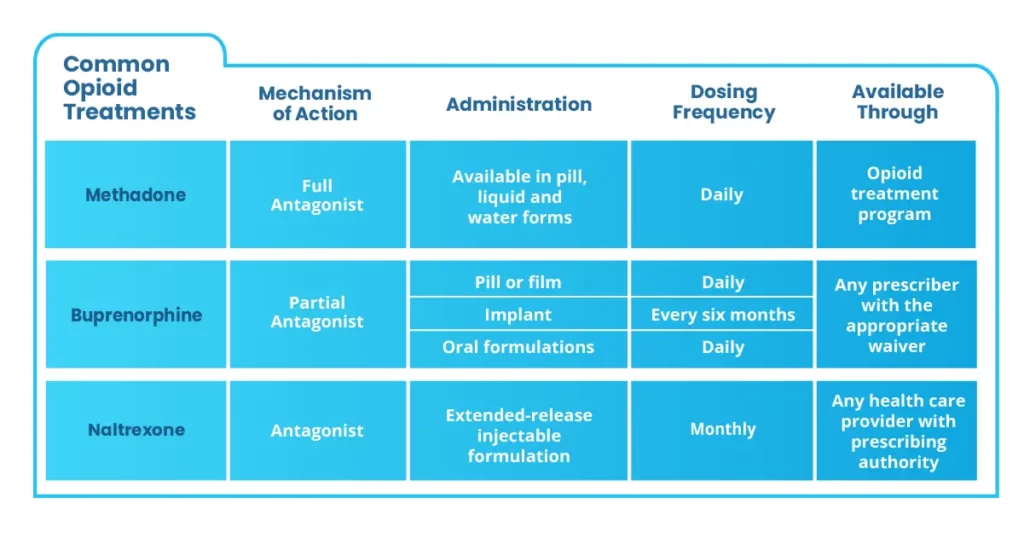
Effectiveness of Medications
- Reduces opioid cravings
- Reduces illicit opioid use
- Reduces risk of opioid overdose
- Increases rate of treatment retention
The use of medications in people with opioid use disorder (OUD) helps manage the withdrawal symptoms, reduce illicit opioid usage, and stay in substance abuse treatment. It has also been demonstrated that methadone and buprenorphine lessen the chance of death from an opioid overdose.
In addition, agonist medications reduce the transmission of infectious illnesses such as HIV and hepatitis C by lowering risky behaviors such as injecting illegal drugs. When patients get therapeutically appropriate dosages of methadone and buprenorphine based on their specific requirements, they can commence and maintain treatment of opioid dependence more easily.
Additionally, before beginning treatment with injectable extended-release naltrexone, patients must detox for seven to fourteen days, meaning they must abstain from opioids. This can make it more challenging for patients to start treatment, resulting in lower treatment initiation rates compared to other drugs. Because neither methadone nor buprenorphine needs detoxification, they are more accessible to those who cannot abstain from opioids long enough to begin naltrexone treatment.
Lack of patient interest in naltrexone, especially opioid detoxification, is cited by some clinicians as a barrier to prescribing the medication. In addition, current studies suggest that, unlike methadone and buprenorphine, naltrexone may not lessen the risk of overdose; further investigation is required to settle contradictory findings about the efficacy of naltrexone treatment.
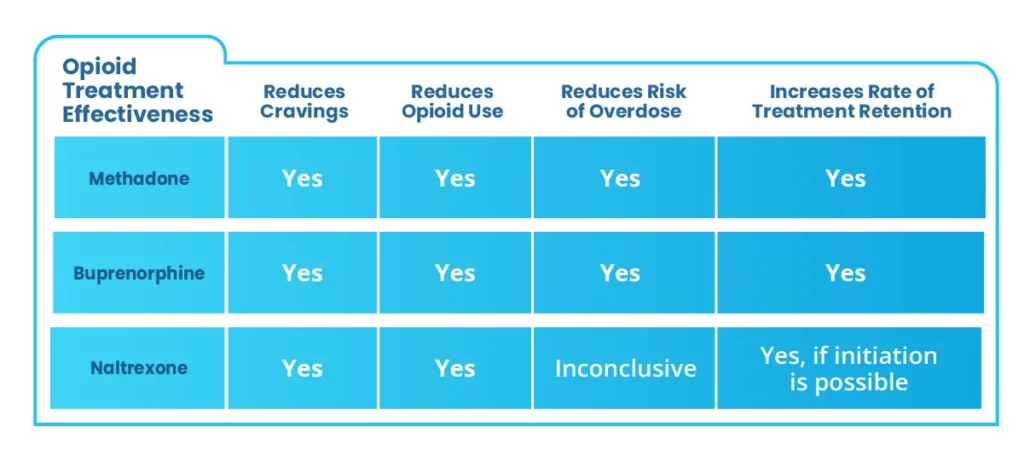
Frequently Asked Questions (FAQs)
Which medication is frequently used to treat opioid addiction?
Methadone and buprenorphine are the medicines most commonly used to treat opioid addiction. Sometimes, another medication, naltrexone, is used.
What are the most commonly used prescription opioids?
What is the best opiate addiction treatment?
Methadone, buprenorphine, and naltrexone are the three medications approved by the Food and Drug Administration (FDA) as the most efficient treatments for substance use disorder (SUD).
What is the best medication to help with an opioid addiction?
A doctor can decide which is best for your specific situation. Methadone, buprenorphine, and naltrexone are a few of the most commonly used medications.
The Haven Can Help You Recover
If you or a loved one are battling opioid addiction, you do not need to fight this battle alone. The Haven treatment services can get you started on the path to recovery.
Our team of medical professionals will personalize treatment programs that work for you. We offer detox programs, various behavioral therapies as well as medication-assisted treatment that effectively combat opioid addiction. Call us at (561) 328-8627 for information and additional resources on different treatment options and to learn how we can assist you in recovery.





